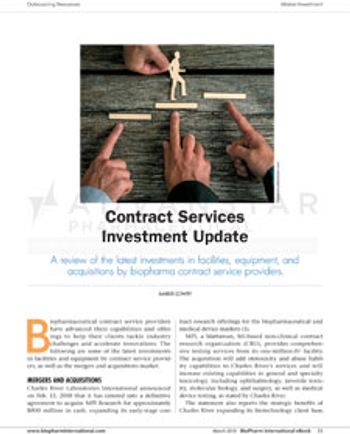
Pfizer transfers CAR-T assets to Allogene Therapeutics under a new alliance to further develop immuno-oncology therapeutics.

Pfizer transfers CAR-T assets to Allogene Therapeutics under a new alliance to further develop immuno-oncology therapeutics.

The companies will co-develop and co-promote a CAR T cell therapy in the United States.

The acquisition strengthens Celgene’s position in the global cellular immunotherapy space.

Takeda is considering approaching Shire with a possible offer.

The agreement gives IncoCell Tianjin, a wholly-owned subsidiary of China-based Boyalife Group, access to Cesca’s celluar processing contract development and manufacturing services.

Hitachi will manufacture regenerative medicines developed by Daiichi Sankyo and SanBio Group.

The collaboration between the two companies aims to finish all necessary work needed to file for a first-in-human study by early 2019.

Emerson will provide Ireland’s National Institute of Bioprocessing Research and Training with technologies to help the institute prepare students for the transition to manufacturing digitization in the biopharmaceutical industry.

The companies intend to jointly develop and commercialize Lenvima (lenvatinib mesylate) as a monotherapy and an in-combination therapy for treating multiple cancer types.

Biogen will acquire an AMPA receptor potentiator for cognitive impairment associated with schizophrenia in a deal worth approximately $590 million.

A review of the latest investments in facilities, equipment, and acquisitions by biopharma contract service providers.

The $11.6-billion acquisition strengthens Sanofi's position in hematology and specialty medicines.

Under this agreement, the companies will develop in parallel an antibody drug candidate and cell lines for other potential candidates.

The pharma major will spin out six molecules in early stage inflammation and autoimmune programs into a new company called Viela Bio.

The contract development and manufacturing organization has entered it first manufacturing contract worth $148 million for its recently completed Plant 3 facility.

The new training center, the Jefferson Institute for Bioprocessing, will prepare engineering students and industry professionals for the field of biologics manufacturing.

Avid Bioservices will provide commercial manufacture of an enzyme replacement therapy by Roivant Sciences' Enzyvant subsidiary.

The companies have partnered to develop and commercialize vectorized antibodies against tau for Alzheimer's and other neurodegenerative diseases.

The company has entered into an agreement with an undisclosed partner to support the development and manufacture of a new biomanufacturing cell line.

The companies have been awarded a collaborative grant of £1.9 million (US$2.6 million) from Innovate UK.

The companies will partner to further immuno-oncology research using humanized mice.

Through its Janssen pharmaceutical companies, Johnson & Johnson, has partnered with Theravance to develop and commercialize a therapeutic for inflammatory bowel diseases.

Amgen plans to invest approximately $300 million in a new biomanufacturing plant in the United States.

Shire will receive exclusive license to develop and commercialize AB Biosciences' pan receptor interacting molecule program for autoimmune and inflammatory diseases.

The acquisition will strengthen Sanofi's R&D strategy and expands its franchise for rare blood disorders.